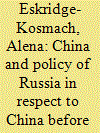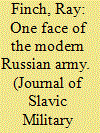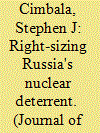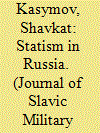| Srl | Item |
| 1 |
ID:
106458


|
|
|
|
|
| Publication |
2011.
|
| Summary/Abstract |
The article is devoted to an analysis of the attitudes of the Russian society towards China as expressed in the Russian press - from the very first pieces of information published in the Russian press about China to the beginning of the Chinese-Japanese War. The Russian press of different political directions did not have definite and precise opinions concerning Russian policy towards China at the beginning and in the middle of the 19th century. Russian journalists, researchers and philosophers began to discuss different aspects of Chinese development and in their publications were expressed the attitudes of the ruling Russian elite, which began to express interest in an active Far Eastern Russian foreign policy.
|
|
|
|
|
|
|
|
|
|
|
|
|
|
|
|
| 2 |
ID:
106457


|
|
|
|
|
| Publication |
2011.
|
| Summary/Abstract |
This article is the first in a new examination of the Romanian Armed Forces during the Second World War. The Romanian Armed Forces were the most important Axis ally on the Eastern Front. To understand the German-Romanian alliance from 1941-1944 one must understand the underlying stereotypes which influenced German interaction with the Romanians. However, far from just categorizing the stereotypes and biases of the Germans toward the Romanians the article also shows how these stereotypes had immediate impact on the alliance and fulfilled important functions for the Germans. Once one understands the stereotypes and their context in German-Romanian military relations, then one can begin to delve into the true extent of Romania's military contribution during the Second World War.
|
|
|
|
|
|
|
|
|
|
|
|
|
|
|
|
| 3 |
ID:
106455


|
|
|
|
|
| Publication |
2011.
|
| Summary/Abstract |
This article will examine General Shamanov's background, the probable rationale for his assignment as airborne commander, his role in the ongoing reform of the Russian military, and the possible future implications for the Russian military and state. This biographical sketch suggests that Shamanov represents a portion of the modern Russian officer corps. These officers (from a variety of security agencies) have merged state, business, and private interests, resulting in a distortion of traditional civil-military relations. As a high-level advisor, and now as Airborne Commander, General Shamanov continues to influence the course of military reform. There is speculation that General Shamanov could become the next Minister of Defense. While the Russian military has a long tradition of remaining outside politics, if the domestic situation in Russia were to become dire, General Shamanov could help choose, or even become, the next Russian commander-in-chief.
|
|
|
|
|
|
|
|
|
|
|
|
|
|
|
|
| 4 |
ID:
106456


|
|
|
|
|
| Publication |
2011.
|
| Summary/Abstract |
Russia and the United States face conflicting pressures with respect to broadening and deepening the regime of strategic nuclear arms reductions agreed to in New START. The Obama administration favors additional reductions in long-range nuclear weapons as well as talks on the status of NATO and Russian non-strategic nuclear weapons located in Europe. At the 2010 Lisbon summit NATO and Russia agreed to prompt discussions on the possibility of creating a European missile defense system with shared responsibility. Against these positives, Russia remains wary of U.S. intent with respect to missile defenses, both states face near term presidential elections that distract from prior commitments, and neither the Obama administration nor the U.S. congressional leadership is ready for a bruising post-New START debate.
|
|
|
|
|
|
|
|
|
|
|
|
|
|
|
|
| 5 |
ID:
106454


|
|
|
|
|
| Publication |
2011.
|
| Summary/Abstract |
Russia's political-economic structure is a neo-Tsarist patrimonial one that fuses together power and position in traditional, even medieval ways. As a result its economy is hobbled by pervasive systemic corruption, misrule, and chronic sub-optimal outcomes. Of necessity these outcomes have a profound impact on Russian security and defense agendas. This article focuses on the relationship between these pathologies of Russian governance and the security and defense situation in regard to Russia's positions in the Russian Far East (RFE) and in comparison with China. It argues that these security and defense outcomes arising out of these pathologies of misrule are undermining Russia's basis for independent action in the Far East and its ability to assume not only a strong security and defense posture in that region, but also its ability to play an independent role in Asia.
|
|
|
|
|
|
|
|
|
|
|
|
|
|
|
|
| 6 |
ID:
106459


|
|
|
|
|
| Publication |
2011.
|
| Summary/Abstract |
This article seeks to identify and assess the general shift in Russian foreign policy thinking during Vladimir Putin's presidency. The main thesis of this article is that a general shift in Russian foreign policy had occurred during Putin's presidency owing to the rise in Statist thinking. To substantiate the thesis, the author uses the State of the Nation addresses of Boris Yeltsin and Vladimir Putin to make a comparative analysis of the presidents' foreign policy approaches. As will be demonstrated in the article, the Russian foreign policy had experienced a dramatic influence of state power during Vladimir Putin's presidency, which resulted in the relative quantitative and qualitative reduction of cooperative initiatives between the United States and Russia.
|
|
|
|
|
|
|
|
|
|
|
|
|
|
|
|